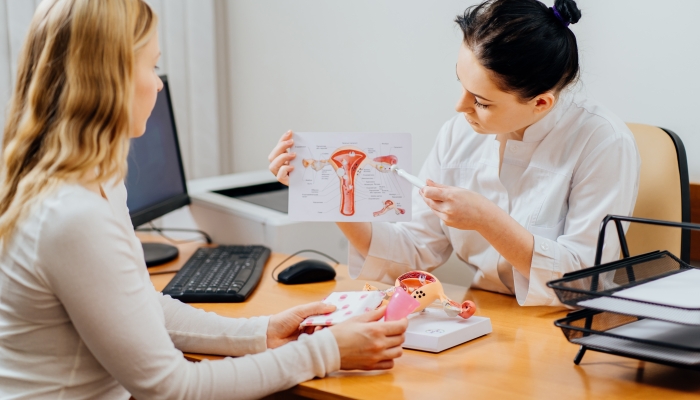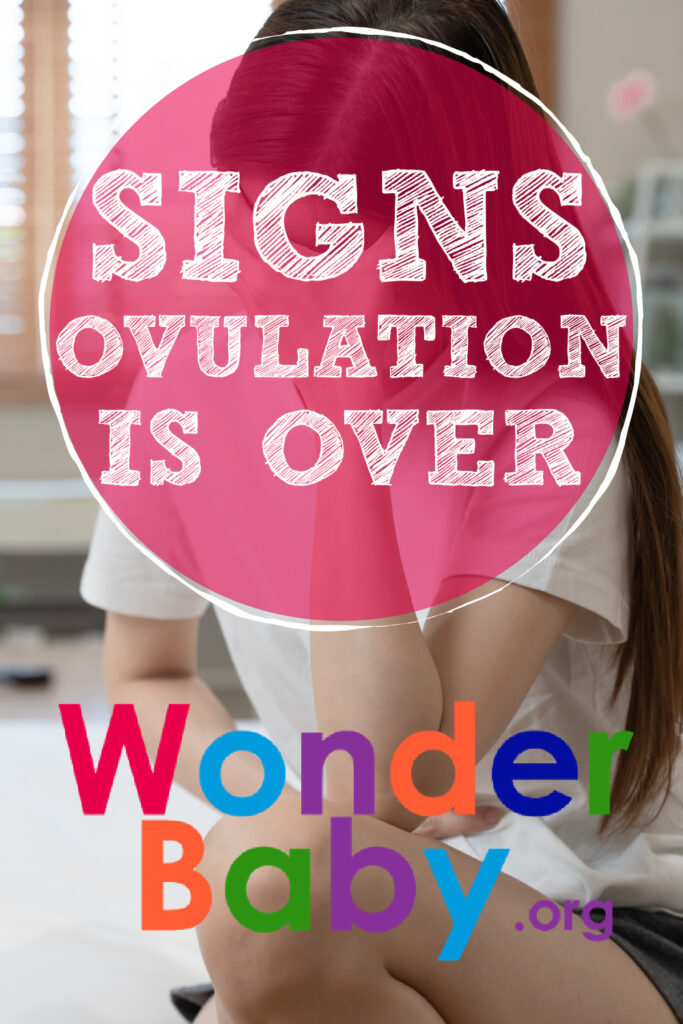7 Signs Ovulation Is Over

- Ovulation usually occurs around day 14 of a menstrual cycle.
- Combining tracking strategies is the best way to predict ovulation.
- Ovulation predictor kits are great for people with irregular periods or who are experiencing fertility problems.
Birth control can be a touchy topic for a lot of people. Hormonal options, barriers, the pull-out method, and tracking ovulation are some of the most popular methods couples use to prevent pregnancy.
On the other hand, people who want to start families may wish to track their ovulation patterns to know when they should be having intercourse to increase the chance of pregnancy. People who have irregular periods or have struggled with fertility may find it even more important to track ovulation.
Whether or not you are ready to start a family, it is important to watch for specific signs that ovulation is over.
What You Need To Know About Ovulation

Ovulation happens when an egg, or ova, is released from a woman’s ovary. After the egg is released, it travels down the fallopian tubes and remains there for about 12 to 24 hours. If a sperm does not reach the egg in that time, fertilization cannot occur.
If the egg is not fertilized by a sperm, estrogen levels and progesterone levels will drop, leading to a shedding of the uterine lining. This is the time when many women experience symptoms of premenstrual syndrome.
Many changes happen during the ovulation period. Some of these changes include:
- Ovulation discharge
- Lower abdominal pain
- Estrogen levels peak
Most women ovulate about once every month. However, certain conditions can affect the timing of ovulation and menstruation. These conditions include:
- Polycystic ovarian syndrome
- Breastfeeding
- Extreme dieting
- Menopause
- Pelvic inflammatory disease
- Uterine fibroids
How to Tell When Your Ovulation Is Over

Tracking your ovulation symptoms is just as important as tracking the first day of menstruation. Whatever your family planning goals are, knowing when ovulation is over can help you be better prepared for the future.
1. Changes in Cervical Mucus
While it might seem gross, looking at your cervical discharge is one of the best ways to track your ovulation. During ovulation, cervical mucus changes to a clear fluid with egg-white consistency. This type of fluid is the easiest for sperm to travel through and creates ideal conditions for fertilization.
After ovulation, cervical mucus typically dries up until menstruation begins. When you notice that your body is producing less cervical mucus, ovulation is probably over.
2. Basal Body Temperature
The European Journal of Obstetrics, Gynecology, and Reproductive Biology11. Martinez, A. R., van Hooff, M. H. A., Schoute, E., van der Meer, M., Broekmans, F. J. M., & Hompes, P. G. A.. The reliability, acceptability and applications of basal body temperature (BBT) records in the diagnosis and treatment of infertility. European Journal of Obstetrics & Gynecology and Reproductive Biology. 1992;47(2), 121–127. https://doi.org/10.1016/0028-2243(92)90041-v has published research showing that tracking basal body temperature is a reliable way to predict ovulation.
If you choose to track ovulation by measuring basal body temperature, it is important that you use the same thermometer at the same time every day. Ideally, you should take your temperature first thing in the morning, before you even get out of bed.
A few days before ovulation occurs, your body temperature will rise by about ½ a degree. Since this is one of the more subtle ovulation signs, it should be used in conjunction with other family planning tools.
3. Hormone Concentrations
Along with watching for ovulation signs like changes in cervical mucus and tracking basal body temperature, many women purchase an ovulation predictor kit to get a more accurate prediction of their fertile window.
Most ovulation tests look for an increase in luteinizing hormone, which increases in the days leading up to ovulation, known as the luteal phase.
Some tests can also monitor for spikes in estrogen, which also spikes during your fertile window. Other tests can detect a rise in the hormone progesterone in the urine, meaning ovulation has already occurred.
4. Changes in Libido
The hormone changes a woman experiences just before ovulation can increase her sex drive. This seems to be Mother Nature’s way of encouraging pregnancy. After ovulation is over, changing hormone levels lead to a decrease in libido and energy levels.
5. Cervical Position
If you feel comfortable, you can check your own cervix to help you figure out whether the ovulation process is over. After washing your hands, insert one finger into your vagina and reach up towards your cervix. During ovulation, your cervix should feel soft. After ovulation, your cervix will be in a lower position and feel more firm, similar to the cartilage on the end of your nose.
6. Abdominal Pain
Some women experience sharp pain in their lower abdomen during ovulation. This pain does not usually last longer than a few hours and may occur only on one side of the body. Mild pain during ovulation is normal, but severe pain is not.
7. Breast Tenderness
Breast tenderness can happen at any time during the menstrual cycle. Breast pain and sore nipples can indicate ovulation, impending menstruation, or pregnancy. The best way to determine the reason for your breast tenderness is to track your symptoms over time. Finding patterns in your breast tenderness can help you predict impending menstruation or ovulation. A daily iodine supplement22. Manage breast pain and tenderness with violet daily iodine supplements. Violet Daily for Breast Pain. 2023. https://violetdaily.com can help alleviate premenstrual breast pain.
Why Is Determining Your Ovulation Cycle Important?

Determining your ovulation cycle is extremely important for family planning. Whether or not you are ready to have children, tracking your fertile days can help you take more control of your life and reproductive health.
Predicting ovulation can help you plan when to have or avoid sexual intercourse, depending on your desire for children. Many women claim that tracking ovulation is the only method of birth control they need. However, experts recommend using additional methods of birth control in addition to the calendar method to avoid unplanned pregnancies.
How to Track Your Ovulation Cycle

The best way to predict ovulation is to monitor all of your signs and symptoms over time. If you have irregular cycles or are nearing menopause, common signs of ovulation may be inconsistent.
For most women, the menstrual cycle lasts about 28 days. Typically, the first day of bleeding on a menstrual cycle is considered day one, and ovulation occurs on day 14. Of course, not all women are exactly the same. Tracking your period and other symptoms over time can give you an idea of your average cycle length and help you determine your ovulation day.
- Tracking basal body temperature
- Tracking menstrual cycle
- Monitoring cervical mucus
- Using ovulation tests
- Hormone tracking at a physician’s office
Can You Still Get Pregnant After Ovulation?
According to the American Pregnancy Association33. Can You Get Pregnant After Ovulation? American Pregnancy Association. 2022. https://americanpregnancy.org/getting-pregnant/infertility/getting-pregnant-after-ovulation, it is still possible to get pregnant for up to 24 hours after the egg is released. If you miss this fertile window and are trying to conceive, you will have to wait until the next cycle for a chance to get pregnant again.
If you are trying to conceive, you should make sure to have sex in the 5 days leading up to ovulation. If you are trying to avoid pregnancy, most experts recommend a more reliable form of birth control than using the calendar method alone.
When Should I See a Doctor about Irregular Menstrual Cycles?

Experts at the Mayo Clinic44. Mayo Foundation for Medical Education and Research. Menstrual cycle: What’s normal, what’s not. Mayo Clinic. 2023. https://www.mayoclinic.org/healthy-lifestyle/womens-health/in-depth/menstrual-cycle/art-20047186 explain that an irregular menstrual cycle may indicate more serious issues. If you experience any of the following, make an appointment with your primary care physician:
- Sudden changes in your cycle
- Bleeding for longer than seven days
- Periods less than 21 days apart
- Periods more than 35 days apart
- Bleeding through more than one pad or tampon in two hours
- Severe pain during your period
- Thoughts of self-harm at any time during your cycle
- Developing a fever after using tampons
FAQs
What factors can affect the signs of ovulation or make it more challenging to determine when it is over?
If you have irregular menstrual cycles, tracking ovulation becomes much more challenging. Challenges like uterine fibroids or polycystic ovarian syndrome can make ovulation symptoms difficult to spot and nearly impossible to predict. If you struggle with anything causing irregular periods, purchasing an ovulation test kit or speaking with your doctor to perform in-office hormone tests may help.
Is it possible to experience multiple ovulation events during a menstrual cycle?
Because of the hormone cycles, your body has to go through to release an egg, it’s not possible to experience multiple ovulation events during a single menstrual cycle. However, you may release more than one egg during ovulation. This often occurs for women undergoing fertility treatment or with a family history of twin births.
Are there any specific dietary or lifestyle recommendations to support fertility after ovulation is over?
The best way to support fertility is to maintain a healthy lifestyle overall. If you are trying to conceive, you may consider taking a prenatal vitamin daily to ensure you get the right vitamins and minerals for a healthy pregnancy.
References
- Martinez, A. R., van Hooff, M. H. A., Schoute, E., van der Meer, M., Broekmans, F. J. M., & Hompes, P. G. A. (1992). The reliability, acceptability and applications of basal body temperature (BBT) records in the diagnosis and treatment of infertility. European Journal of Obstetrics & Gynecology and Reproductive Biology, 47(2), 121–127. https://doi.org/10.1016/0028-2243(92)90041-v
- Manage breast pain and tenderness with violet daily iodine supplements. Violet Daily for Breast Pain. (2023, April 11). https://violetdaily.com
- Can You Get Pregnant After Ovulation? American Pregnancy Association. (2022, February 7). https://americanpregnancy.org/getting-pregnant/infertility/getting-pregnant-after-ovulation
- Mayo Foundation for Medical Education and Research. (2023, April 22). Menstrual cycle: What’s normal, what’s not. Mayo Clinic. https://www.mayoclinic.org/healthy-lifestyle/womens-health/in-depth/menstrual-cycle/art-20047186

The information WonderBaby provides is not intended to be, and does not constitute, medical or other health advice or diagnosis and should not be used as such. Always consult with a qualified medical professional about your specific circumstances.
Related Posts

Pregnancy
How To Deal With an Ingrown Hair on a C-Section Scar
Ingrown hairs on a C-section scar can be treated using a warm compress or mild exfoliation. Infected ingrown hairs may require antibiotic treatment.

Pregnancy
What’s a Dye Stealer Pregnancy Test?
A dye stealer pregnancy test usually means that your hCG levels are very high, which is typically considered a good sign for pregnancy.

Pregnancy
Can Yelling Cause a Miscarriage?
Yelling alone can not cause a miscarriage. However, maternal stress can cause high blood pressure, preterm labor, and other health problems.